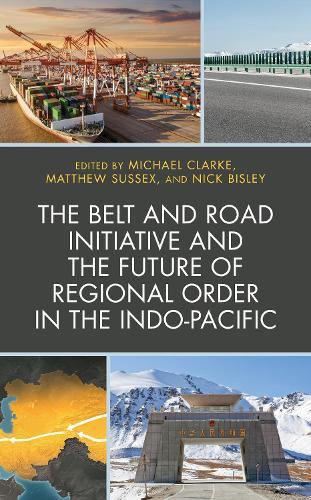
The Belt and Road Initiative and the Future of Regional Order in the Indo-Pacific
(Hardback)
Publishing Details
The Belt and Road Initiative and the Future of Regional Order in the Indo-Pacific
By (Author) Michael Clarke
Edited by Matthew Sussex
Edited by Nick Bisley
Contributions by Mark Beeson
Contributions by Nick Bisley
Contributions by Lai-Ha Chan
Contributions by Mordechai Chaziza
Contributions by Michael Clarke
Contributions by Jane Golley
Contributions by Ian Hall
Bloomsbury Publishing PLC
Lexington Books
20th January 2020
United States
Classifications
Professional and Scholarly
Non Fiction
327.51
Physical Properties
Hardback
254
Width 157mm, Height 239mm, Spine 25mm
562g
Description
The Belt and Road Initiative (BRI) is emerging as a vital lynch-pin in China's efforts to establish a maritime and continental zone of influence in the Indo-Pacific region. The Belt and Road Initiative and the Future of Regional Order in the Indo-Pacific interrogates to what extent BRI represents an achievable vision of a China-centric order in Asia and explores its major security implications for the region. The contributions to this volume provide up-to-date analysis of the effect of BRI on the region's foreign policy and alliance patterns, its connection to geo-economics and domestic Chinese politics, and the policy responses of key Indo-Pacific actors. While acknowledging that BRI remains prey to a variety of internal and exogenous shocks, the contributors conclude that at the very least BRI will continue to disrupt the existing alignments of economic and strategic interests in the Indo-Pacific and that on this minimal basis BRI will likely be judged a success by China. For regional actors, however, the BRI simultaneously enhances choice while presenting strategic and economic risks of greater dependency on China - a dilemma intensified by the disruptive effects of the Trump administration on regional confidence in the longevity of American commitments and leadership.
Reviews
In this study of China's Belt and Road Initiative (BRI), the contributors consider the extent to which the project could succeed in establishing a 'China-centric order' in Asia and what it means for regional security. The authors suggest that China is likely to be satisfied with the way the BRI is disrupting existing economics and strategic alignments in the Indo-Pacific.
-- "Survival: Global Politics and Strategy"The Belt and Road Initiative and the Future of Regional Order in the Indo-Pacific should interest academics and policymakers inside and outside the region. The book offers insightful up-to-date analyses and perspectives for understanding the BRIs implications (and challenges) in the years to come, and it zeroes in on important questions that remain unanswered.
-- "International Journal of Asian Studies"The Belt and Road Initiative offers valuable insights for understanding the BRI and its overall performance to date. It may be read with profit by anyone interested in Asian politics in general and particularly students across the social science disciplines who are eager to know more about the political, economic, and security implications of the BRI. The book provides an excellent grounding and foundation for understanding the economic, political, social, and cultural perspectives of the BRI.
-- "Asian Affairs"Author Bio
Michael Clarke is associate professor at the National Security College at Australian National University. Matthew Sussex is associate professor at the National Security College at Australian National University. Nick Bisley is professor of international relations at La Trobe University.
